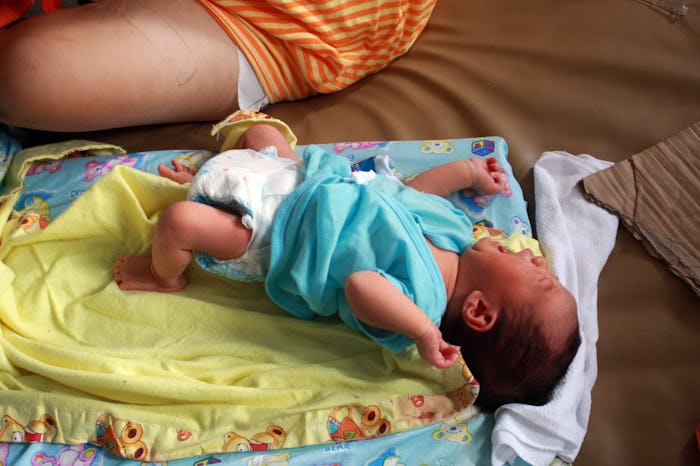Life

Why You Shouldn't Feed A Crying Baby Unless They're Hungry
As a parent, you sometimes need a white board, dry erase markers, and Albert Einstein's mind to figure out why your infant is bawling their eyes out. Are they wet? Gassy? Tired? Hungry? Scared? You may spend hours going through every tool in your arsenal to try and calm your little one down. For many mamas and papas, that could mean feeding their kiddo on demand. But now researchers suggest parents rethink their initial soothing techniques, because feeding a crying baby could impact their health later in life.
According to The New York Times, researchers at the Penn State College of Medicine found that parents who used calming strategies other than feeding had babies who were more likely to sleep better and less likely to be overweight than their counterparts. The results came from an intervention trial, known as the Insight study, where parents learned to try alternative soothing techniques such as swaddling, repositioning, playing white noise, and rocking before giving their kid food, The New York Times reported last Monday.
Dr. Ian Paul, one of the lead researchers, told the Times that cranky babies may not be hungry but will calm down if given something sweet to eat. It's a so-called food reward that could overtake their "normal ability to regulate their emotions," Paul said, leading kids to self-soothe with food as adults.
"Responsive parenting" training, on the other hand, is meant to help parents better read their infants' signals. According to the World Health Organization (WHO), mothers being affectionate and warm and responsive to their baby's needs leads to improved child health and development. Specifically, a parent's responsiveness can lead to kids showing better problem-solving, language, and social skills, according to the Harvard Family Research Project.
But WHO noted in its 2006 bulletin that many factors, including poverty, stress, and illness, can weaken a parent's responsiveness. That's where "responsive parenting" intervention trials, such as the one featured in The New York Times, come into play.
The Insight study is limited in a lot of ways, though. Although Penn State researchers found a correlation between feeding on-demand and weight gain, the trial doesn't take into account the wildly different appetites among babies. A study published in JAMA Pediatrics found a similar link between eating behaviors and obesity risk in children, but the author, Dr. Julie Lumeng, told the Times that more research is needed to better understand what babies want. She said,
Babies are born with different temperaments and I don’t think it’s crazy to say that some babies are voracious eaters and some are not and they require different kinds of parenting.
It can't hurt for parents to learn alternative strategies for baby soothing, especially if that will help them better decipher their child's needs. But parents shouldn't feel shame for how they choose to calm their infants. They know their babies better than anyone else.